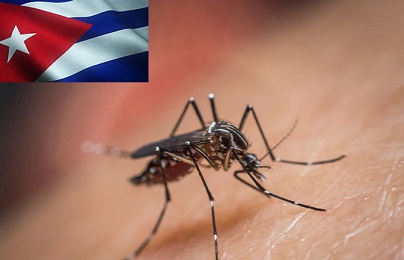Dengue Surge Forces Puerto Rico To Initiate A Public Health Emergency. 549 Cases, 341 Hospitalizations, 29 In ICU
Nikhil Prasad Fact checked by:Thailand Medical News Team Mar 31, 2024 1 year, 3 weeks, 4 days, 9 hours, 31 minutes ago
Dengue News: Puerto Rico finds itself in the throes of a severe dengue epidemic, prompting urgent public health measures and international attention. Health authorities in Puerto Rico declared dengue a Public Health Emergency as hospitals start to become swamped with caseloads.
https://twitter.com/TelemundoNews/status/1773692886019645592
 Dengue Surge Forces Puerto Rico To Initiate A Public Health Emergency
Dengue Surge Forces Puerto Rico To Initiate A Public Health Emergency
With a surge in dengue cases, understanding the specific numbers, impacts, and response strategies becomes crucial. This
Dengue News report delves into the statistical realities of the dengue epidemic in Puerto Rico, the resultant public health challenges, and the collaborative efforts underway to mitigate the crisis.
The Dengue Numbers in Puerto Rico
As of the latest data, Puerto Rico has recorded a staggering 549 cases of dengue this year alone, marking a troubling 140 percent increase compared to the same period last year. Within these cases, 341 individuals have been hospitalized due to severe dengue symptoms, highlighting the gravity of the situation. Moreover, 29 of these cases have escalated to intensive care units (ICUs), indicating the severity and strain on healthcare facilities.
Understanding the Impact of Dengue Fever
Dengue fever manifests in various forms, ranging from mild flu-like symptoms to severe dengue hemorrhagic fever (DHF) and dengue shock syndrome (DSS). The latter conditions can lead to life-threatening complications, especially among vulnerable populations such as children, the elderly, and individuals with compromised immune systems.
The surge in hospitalizations and ICU admissions due to dengue underscores the immense burden on Puerto Rico's healthcare system. Beyond the immediate health impacts, the economic and social toll of the epidemic is significant, affecting productivity, healthcare costs, and overall well-being.
Factors Driving the Dengue Epidemic in Puerto Rico
Several factors contribute to the rapid spread of dengue in Puerto Rico:
-Climate Conditions: Puerto Rico's tropical climate provides an ideal environment for the proliferation of Aedes mosquitoes, the primary vectors for dengue transmission. Warmer temperatures and humidity accelerate mosquito breeding cycles, amplifying the risk of dengue outbreaks.
-Urbanization Challenges: Rapid urbanization, coupled with inadequate waste management and water storage practices, creates breeding grounds for mosquitoes. Urban areas, including densely populated regions, face heightened dengue transmission risks.
-Global Travel Dynamics: Travel-related cases contribute to the introduction and spread of dengue within Puerto Rico. The movement of infected individuals, along with trade and tourism activities, faci
litates the dissemination of the dengue virus across borders.
-Vector Control Efforts: Traditional vector control methods, such as insecticide spraying and larviciding, face challenges in effectively targeting Aedes mosquitoes. Environmental concerns and emerging insecticide resistance necessitate innovative and sustainable vector control strategies.
Response Measures and Collaborative Efforts
In response to the dengue crisis, Puerto Rico has implemented multifaceted strategies:
-Public Health Emergency Declaration: The declaration of a public health emergency enables rapid resource mobilization, enhanced surveillance, and coordinated response efforts.
-Vector Control Programs: Intensified mosquito control measures, including targeted spraying, larval source reduction, and community engagement, aim to reduce mosquito populations and interrupt transmission.
-Healthcare Capacity Strengthening: Hospitals and healthcare facilities have augmented their capacity to manage dengue cases, ensuring adequate supplies, trained personnel, and streamlined patient care pathways.
-Public Awareness Campaigns: Public education initiatives emphasize preventive measures, such as using insect repellents, eliminating stagnant water sources, and seeking medical care for dengue symptoms.
Global Collaboration and Future Outlook
The dengue epidemic in Puerto Rico resonates with broader global trends in dengue prevalence and transmission dynamics.
Many countries especially in Central and South America are also facing a dengue crisis at the moment with countries like Argentina, Brazil and Peru also declaring public health emergencies as a result of rising Dengue cases.
https://www.thailandmedical.news/news/argentina-battles-historic-dengue-outbreak-103,000-cases-and-79-deaths-in-first-ten-weeks-of-2024-healthcare-crisis-as-other-diseases-also-soars
https://www.thailandmedical.news/news/brazil-records-more-than-1-million-cases-of-dengue-and-214-deaths-for-first-two-months-of-2024
https://www.thailandmedical.news/news/dengue-news-health-emergency-declared-in-peru-as-dengue-crisis-escalates
International collaboration, guided by scientific research and evidence-based practices, plays a pivotal role in addressing dengue challenges worldwide.
Moving forward, sustained efforts in surveillance, vector control, vaccination campaigns, and climate adaptation are essential to curbing the dengue burden in Puerto Rico and beyond. By leveraging innovative strategies, community engagement, and cross-sectoral partnerships, Puerto Rico aims to navigate the dengue crisis while building resilience against future epidemics.
For the latest
Dengue News, keep on logging to Thailand Medical News.
